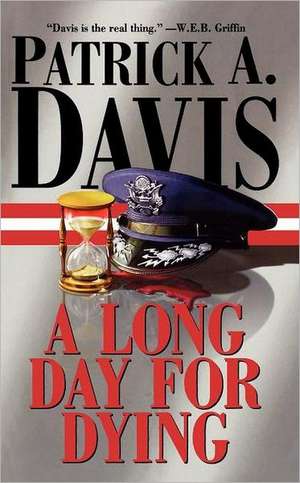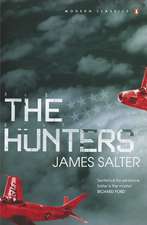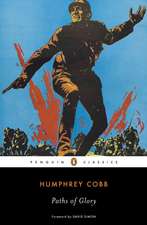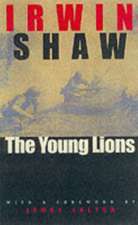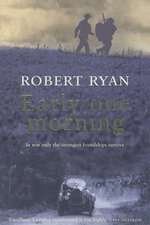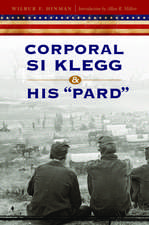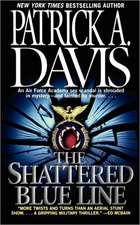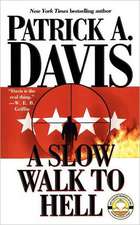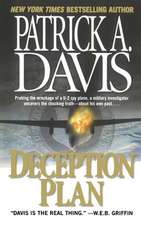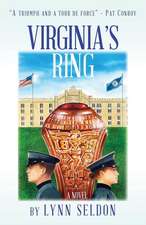A Long Day for Dying
Autor Patrick A. Davisen Limba Engleză Paperback – 31 dec 2010
A LONG DAY FOR DYING
When General Michael Garber, the newly appointed Chairman of the Joint Chiefs of Staff, is discovered dead in the private compartment of his airplane, Air Force investigator Martin Collins finds himself thrust into the most dangerous case of his career. What initially appears to be an accidental death turns out to be a near-perfect murder -- and three members of the Joint Chiefs are the prime suspects.
As Martin weaves his way through a puzzling maze of blood and deceit, he finds himself in the firing line of Garber's enemies, including a half-mad rival general who collects the ears of the men he's killed, and the ruthless female secretary of defense, whose hatred for Garber knows no bounds. With his life and the honor of the military at stake, Martin has only twenty-four hours to uncover a legacy of secrets that no one wants brought to light -- secrets that the most powerful forces in Washington will kill to keep buried....
Preț: 154.52 lei
Nou
Puncte Express: 232
Preț estimativ în valută:
29.57€ • 31.62$ • 24.65£
29.57€ • 31.62$ • 24.65£
Carte disponibilă
Livrare economică 27 martie-10 aprilie
Preluare comenzi: 021 569.72.76
Specificații
ISBN-13: 9781451613162
ISBN-10: 1451613164
Pagini: 448
Dimensiuni: 127 x 203 x 28 mm
Greutate: 0.4 kg
Editura: Gallery Books
Colecția Gallery Books
ISBN-10: 1451613164
Pagini: 448
Dimensiuni: 127 x 203 x 28 mm
Greutate: 0.4 kg
Editura: Gallery Books
Colecția Gallery Books
Extras
Chapter One
MORNING
I heard the faint beating of the rotor blades long before I saw the approaching helicopter.
It was a cool spring morning, a little after sunrise, and I'd just stepped out onto the porch of my rambling farmhouse in rural northern Virginia. I gazed toward the east, past the grass airstrip my crop-duster father had built thirty years earlier and the farm fields he no longer owned. Searching the horizon, I finally saw it. A speck, coming out of the glow of the sun. I checked my watch. Almost seven-twenty. Right on time, and I wondered what I was getting myself into.
My regular job is chief of police for Warrentown, Virginia, a quiet town of four thousand, roughly seventy miles west of D.C. Occasionally I also moonlight as a consultant to the Office of Special Investigations, the air force's primary criminal investigative branch. I'd taken the job as a favor to then-OSI commander Brigadier General Gary Mercer, who'd lost a lot of his experienced personnel to the better-paying jobs in the civilian world. To stem the bleeding, Mercer hired on a few former investigators like myself -- I'd put in twenty years in the OSI, retiring as a light colonel -- to consult on the more "sensitive" cases. By sensitive, General Mercer meant things like espionage, major drug rings, murders -- anything that might garner the attention of the press or Congress or the four-star constellations at the Pentagon.
Since the military isn't exactly a hotbed of crime, the consultant workload is pretty light, and I average maybe three cases a year. In the past, I've always looked forward to getting called out as a change of pace from the Andy-of-Mayberry routine. But not today.
The reason the helicopter was flying out to pick me up stems from a conversation I'd had earlier with Colonel Charles Hinkle, the current OSI chief. I'd been in the shower when the phone rang. Mrs. Anuncio, my live-in housekeeper, had banged on the bathroom door until I finally yanked it open, a towel cinched around my waist, dripping water all over the place.
Ignoring my scowl, Mrs. Anuncio stuck a portable phone up to my face. "Man say must talk. Important."
"I don't care. Tell him I'll call back when I'm dressed."
Mrs. Anuncio made like she suddenly didn't understand English. She stood there, holding out the phone, her square face locked with a stubborn gaze.
Christ. Sometimes I wondered who really worked for whom. I repeated irritably, "Mrs. Anuncio, tell him I will call after -- "
That was as far as I got before a familiar voice chirped out at me. "Marty, pick up the goddamn phone. Now."
Mrs. Anuncio smiled smugly. I sighed, blinked water from my eyes, and took the phone. As she turned her bulky frame for the door, she announced breakfast was ready. When I asked for an omelet, she bluntly replied that she'd made waffles.
I could only smile at her response. Mrs. Anuncio had worked for me for almost a month before I figured out that her gruff exterior was mostly an act. She just had a military DI's attitude toward running the household. The way she saw it, after three years of looking after my daughter Emily and me, I should know the rules by now. If I'd wanted an omelet, I should have asked before the waffles were made.
As I toweled off, the man on the phone began calling out to me again. With a last swipe at the blond crew cut that passed for my hair, I put the receiver to my ear. In the background, I heard the sound of clicking keyboards and ringing phones. Office sounds. No surprise that Colonel Charles Hinkle was already at work. Since the 9-11 terrorist attacks, the OSI had been humping around the clock to plug security leaks.
"Marty? Marty? If you don't pick up, so help me -- "
"Remember your blood pressure, Charlie. Now what's so damned important that I couldn't finish my shower?" Even though Charlie was my boss, I could talk to him this way because we'd known each other since our days as young captains. I wasn't all that concerned about Charlie's anxious tone, since he tended to overreact, often blowing the most mundane events out of all proportion.
Ignoring my crack, he said, "I'm only going to say this once, so listen up. You got anything scheduled, cancel it. I want you to be ready to roll ASAP -- "
"Sorry, Charlie. I'm not available." I hung the towel over the shower rail, let him sputter for a moment, then went over to the bureau and began to dress.
"Why the hell not?" he demanded.
"Personal reasons."
"For instance?"
"Emily's turning thirteen tomorrow. We've got a big party planned."
Silence. There was nothing he could say. Since my wife's death from cancer three years earlier, he knew that my daughter Emily was the priority in my life.
He cleared his throat. "Look, I wouldn't ask if it wasn't important -- "
"No, Charlie."
"I could order you."
A bluff. I quoted him the clause in my consulting contract, which specifically stated I could decline an investigation.
"Don't pull that legal crap on me. You've already been assigned to a task force -- "
"Unassign me. Give it to Erik Olson or maybe Bob Whitcher -- "
"I can't. The SECDEF assigned you to the task force. Personally."
I was tugging on my underwear and almost toppled over. "Jesus..."
"Yeah. This thing is big, Marty. I just got off the horn with General Markel, the vice chairman of the Joint Chiefs. He ordered me to send a major crimes forensics team to Andrews and said that the SECDEF specifically requested that you and Major Gardner be assigned to a task force that's being put together."
I slowly donned a T-shirt as I tried to take this in. Major Amanda Gardner was another OSI investigator who happened to live next door, on a couple of acres she'd sweet-talked my dad into selling her. I asked Charlie why the secretary of defense would ask for us.
"Hell, I figured you two must have run across Secretary Churchfield on a case in the past. You didn't?"
I told him I'd never even met Churchfield and was damned certain Amanda hadn't either.
"Well, someone with a helluva lot of pull must have passed on your names. You connected, Marty?"
He meant politically. "You know better than that. Who else is assigned to the case?"
"From the OSI, just you two and the forensics techs. Doc Bowman will be the ME."
Dr. Billy Bowman was the extremely capable yet mildly irritating deputy head of the Armed Forces Institute of Pathology. I said, "So we're talking about a homicide on Andrews -- "
"Not so fast, Marty. You in or not?"
As if I really had a choice now. "I'm in." Stepping into my closet, I plucked out my Sears special navy blue suit. Even for active-duty military investigators, civilian clothing was standard attire because wearing one's rank tended to hinder investigations. Enlisted members felt intimidated when grilled by someone they knew was an officer, and officers often proved less than cooperative when questioned by someone they outranked.
"The answer," Charlie grunted, "is that I don't know any specifics. According to General Markel, the task force is operating under a TS/SCI clearance."
A top-secret/special compartmentalized information clearance meant that only those with a strict need-to-know would be privy to the details of the investigation. While it was unusual that a criminal matter would be tagged with this lofty security classification, it was even more unusual that Charlie, in his capacity as OSI chief, would be kept out of the loop.
For once, Charlie wasn't crying wolf. Something big had happened.
As I finished dressing, Charlie gave me the rest of what he knew, which wasn't much. No, he didn't know who would head the investigation or which agencies would take part. Yes, he suspected the FBI would probably honcho the thing, since they were the glory boys of the investigative world. Major Amanda Gardner and I were to meet the forensic team at the Andrews AFB passenger terminal, where we would receive further instructions.
The location of the terminal suggested we might be flying to the location of the crime. When I asked, Charlie said not to bother packing a bag. The team wasn't flying anywhere.
That, of course, wasn't quite true.
While I was at the breakfast table, notifying my office that I'd be out of pocket for a few days, my call-waiting beeped. It was Charlie, telling me that the two-plus hours it would take Amanda and me to fight the rush hour traffic to Andrews was unacceptable. A helicopter would land on the grass strip in front of my house at 0730 hours, to pick us up. He asked me to pass on the change to Amanda.
When I tried, I got her machine, so I went out onto the back patio for a look.
Amanda lived in a modest ranch house a couple of hundred yards away. It was a tidy place fronted by flower beds and a lawn big enough for a game of touch football. In keeping with her rural upbringing, she'd recently added a small barn, where she kept a menagerie of animals, including a horse, a potbellied pig, and a couple of ducks. I located her in a corner of the fenced-in backyard, filling the water dish for her two dogs, a German shepherd and a golden retriever. I hollered twice before she glanced over. When I held up the phone, she nodded, tossed a ball for the dogs, and walked quickly toward the house.
Amanda had a nice walk. She's long and willowy and, at thirty-three, still moves with the easy strides of the athlete she once was. A tomboy since she could remember, she'd earned a tae kwon do black belt by the time she was sixteen and lettered in swimming at the Air Force Academy. She also has big-time smarts, graduating with degrees in engineering and physics. A tenacious investigator, she'd impressed me on the first murder case we'd worked, and I'd assumed she was one of those annoying people who did well at everything.
Then she told me about her track record with men.
I would have expected Amanda, as an attractive woman in a predominantly male profession, to get asked out constantly, but she doesn't. Since we've been neighbors, I've known her to go out on only two dates. Neither guy ever called again. The only thing I can figure is that men find her self-assurance intimidating. Her blunt assessment is that no guy wants a relationship with a bright, competent woman who can also kick his ass.
Amanda acts like it's no big deal not having much of a social life. She's often mentioned how she prefers being single and having the freedom to do as she pleases. Besides, it wasn't like she had time for a relationship. Not with the demands of her job and a new house to worry about.
Sometimes, I almost believed her.
I thumbed the redial as Amanda disappeared into the house, and she picked up immediately. After I dropped the dime on curbside chopper service, she said, "I've been surfing the news. Nothing. Whatever's going down, they're doing a good job keeping it under wraps."
"It's got to be a homicide. Why else would they call Doc Bowman out?"
"Since when do they classify homicides?"
The million-dollar question. Andrews Air Force Base housed the military's aircraft fleet that flew the government's elite, from the president on down. In light of the terrorist threat, I suggested that someone might have taken out a heavy hitter, which might explain all the secrecy.
"I dunno, Marty. Security on Andrews is damned tight. I don't see some Al Qaeda wanna-bes making it past the checkpoints."
I resisted the urge to say they wouldn't show up in beards, wearing "Bin Laden for President" T-shirts. Still, she had a point. Andrews was probably only a staging area for the team to meet without eyebrows being raised.
"How about the SECDEF?" she asked. "Any clue why Churchfield requested us?"
"Obviously, we were recommended."
"By who, if it wasn't Colonel Hinkle?"
"It's puzzling." By definition, the OSI was a secretive, close-knit organization. It's unlikely anyone outside the immediate chain of command would be familiar enough with our abilities to recommend us by name. Yet someone had.
As I was about to hang up, she said, "I'm kind of surprised you took the case. I mean, with Emily's party tomorrow -- "
"Can't turn down the SECDEF."
"You okay with that?"
My silence confirmed what she knew; I wasn't. Missing your kid's party may not seem like a big deal, but it was to me. Before she died, my wife, Nicole, made me promise that I'd always place Emily at the top of my list. Over the years, I'd kept my word. Emily's soccer matches, school plays, band recitals -- you name it, I was always there, sitting right up front.
"You tell Emily yet?" Amanda asked.
"She's getting ready for school. She'll be okay. Helen will be here." Helen was my stepdaughter from Nicole's first marriage. After Nicole's death, Helen had lived with Emily and me, running the crop-dusting business my father left me so I could play cop full-time. Six months ago, Helen moved out. It was a financial decision; business had been drying up because a lot of the area farms had been gobbled up by developers. Helen bought a place with a small airstrip about a hundred miles west, in tobacco country. I gave her the two planes on the condition that she retain the name Collins Aviation. When my dad retired to Florida, his dream had been for me to keep the business going. Since I hated flying crop dusters, having Helen take over was a no-brainer. Dad was happy someone in the family was still flying planes with his name on the side, and I was happy that person wasn't me.
"Emily will be disappointed," Amanda said. "So if you don't mind a suggestion..."
It didn't matter if I did. Over the past year, Emily and Amanda had spent a lot of time together. It was a relationship I'd encouraged; Emily needed a female role model in her life. The downside was, I had to put up with Amanda's less than subtle hints on parenting. "What?"
"Give Emily her present now."
"It's not her birthday."
"So what? You want her to be happy, right?"
"Sure, but -- "
"At least bring her over and let her see it."
"I'm going to wait."
She began to argue with me. I interrupted her, saying it was because of the letter.
"Letter? What letter?"
So I explained how Nicole had written a series of letters, to be given to Emily on each birthday, until she turned twenty-one. The letters were filled with humorous anecdotes and advice on life. The kinds of things a mother tells a daughter. Over the years, I had learned to give Emily the letter a couple days before her birthday, to give her time to recover emotionally so she could enjoy her party. "Emily read it last night," I said. "She's pretty down. Even if I tell her about the pony now, it might not do much good."
Amanda was quiet. For once she seemed at a loss for words. "It must have been difficult for Nicole. To write those letters."
"It was," I said. "She wrote them shortly before she died. She could barely hold a pen. It took her almost a week."
Amanda started to say something, but her voice began breaking. Her display of emotion caught me off guard. I said, "Amanda, I didn't mean to -- "
The phone clicked softly in my ear.
I returned to the breakfast table, perplexed by Amanda's reaction. She'd always been someone who prided herself on maintaining control, keeping her feelings in check. It was an image she'd carefully cultivated, to prove she was as tough as any male investigator. I'd seen her walk into the gore of a triple homicide crime scene where two of the victims were children and never bat an eye. Same thing with the funerals for victims of the 9-11 attack on the Pentagon. People getting teary-eyed all over the place, including me.
But not Amanda.
Uh-uh. Someone with her emotional discipline doesn't break down because of a touching story over the phone. That meant there had to be another reason.
As I sipped my coffee, I thought back to when I first realized something was wrong.
t had been almost two months earlier. Initially, there wasn't anything I could put my finger on. I just sensed a sadness around Amanda. A short time later, she began withdrawing into herself. She quit dropping by for dinner and frequently didn't answer her phone when I called. Last week, Emily popped over to see her and noticed her eyes were red, as if she'd been crying. What I found particularly worrisome was Amanda's recent habit of sitting on her porch in the evenings. She'd remain there for hours, sipping on wine and staring into the dark. More than once, I'd been on the verge of walking over, but for some reason, I could never bring myself to do it. If she wanted my company, she'd ask.
Emily had decided that Amanda was lonely and had been bugging me to find her a boyfriend. Maybe I'd give it a try. Deep down, I cared for Amanda more than I'd liked to admit, and to see her so unhappy --
My thoughts were interrupted by the clicking of Emily's footsteps on the hardwood floor. I turned to the entryway and saw the dejected slope of her shoulders and the sadness in her eyes. At that moment, I hated myself for what I was about to say.
But that was the price of being a single parent.
Emily slowly made her way up the table, her curly brown hair still damp from her shower. With each passing year, she looked increasingly like her mother. Same wide-set blue eyes, lightly freckled cheeks, and dimpled chin. And she was getting tall, well over five feet. She wouldn't be a child much longer.
As she listlessly dropped her Britney Spears backpack to the floor and slipped into her chair, I said, "How are you holding up, honey?"
A little shrug. "Okay, Dad. I miss Mom."
"We all do." She sat, staring vacantly at her plate. I said, "Better eat something."
"Not hungry."
"Try."
She reluctantly fished a waffle from the serving plate. I asked, "Mind if I read the letter?" Because we always discussed them together, so I could make sure she understood everything Nicole was trying to tell her.
Emily's hand froze. She looked at me with a mixture of guilt and fear.
I frowned. "What is it, honey?"
No response. She dropped the waffle back to the plate and sat back.
"Is it the letter?" I asked gently.
She hesitated, nodded. "You...you can't read it, Dad."
"Oh? Mind telling me why?"
She stared at her plate, avoiding my eyes. "It's...personal."
"I see." But I didn't. I sat there, feeling a little hurt and confused. Nicole and I never had secrets. I couldn't believe she'd have written anything that I wasn't supposed to know about.
Mrs. Anuncio pushed through the kitchen door, took one look at Emily's downcast expression, and glared at me.
"I...I gotta go, Dad." Emily pushed back her chair and climbed to her feet.
"Go? You still have ten minutes until the bus."
But she'd snatched up her knapsack and was hurrying toward the door.
"Emily, wait. There's something I need to tell you."
Her pace quickened.
"Emily! I told you to get back -- "
She flung open the door and was gone. Through the window, I saw her running up the gravel road toward the two-lane highway and the bus stop. She kept wiping at her eyes. From behind, I heard Mrs. Anuncio go off on me in Spanish. When I turned around, she was glaring at me, hands on her hips.
I sighed. "Mrs. Anuncio, it's not my fault. I didn't say anything."
She snorted and withdrew into the kitchen. I heard dishes banging.
For the next few minutes, I sipped coffee and tried to resist the impulse. I finally went upstairs to Amanda's room. The letter was with the others, in one of Nicole's old jewelry boxes, sitting on a corner of the dresser beside the brass-framed picture of Nicole.
I removed the envelope and stood there staring at it for what seemed a long time. My eyes went to Nicole's picture.
They're Emily's letters, Marty. Promise you won't read them unless she asks.
I promise, honey.
My hand was trembling as I returned the letter to the jewelry case. By the time I got downstairs, the phone was ringing. It was Amanda, her voice clipped, urgent.
"Better get outside, Marty," she said. "I think I hear it."
Copyright © 2003 by Patrick A. Davis
MORNING
I heard the faint beating of the rotor blades long before I saw the approaching helicopter.
It was a cool spring morning, a little after sunrise, and I'd just stepped out onto the porch of my rambling farmhouse in rural northern Virginia. I gazed toward the east, past the grass airstrip my crop-duster father had built thirty years earlier and the farm fields he no longer owned. Searching the horizon, I finally saw it. A speck, coming out of the glow of the sun. I checked my watch. Almost seven-twenty. Right on time, and I wondered what I was getting myself into.
My regular job is chief of police for Warrentown, Virginia, a quiet town of four thousand, roughly seventy miles west of D.C. Occasionally I also moonlight as a consultant to the Office of Special Investigations, the air force's primary criminal investigative branch. I'd taken the job as a favor to then-OSI commander Brigadier General Gary Mercer, who'd lost a lot of his experienced personnel to the better-paying jobs in the civilian world. To stem the bleeding, Mercer hired on a few former investigators like myself -- I'd put in twenty years in the OSI, retiring as a light colonel -- to consult on the more "sensitive" cases. By sensitive, General Mercer meant things like espionage, major drug rings, murders -- anything that might garner the attention of the press or Congress or the four-star constellations at the Pentagon.
Since the military isn't exactly a hotbed of crime, the consultant workload is pretty light, and I average maybe three cases a year. In the past, I've always looked forward to getting called out as a change of pace from the Andy-of-Mayberry routine. But not today.
The reason the helicopter was flying out to pick me up stems from a conversation I'd had earlier with Colonel Charles Hinkle, the current OSI chief. I'd been in the shower when the phone rang. Mrs. Anuncio, my live-in housekeeper, had banged on the bathroom door until I finally yanked it open, a towel cinched around my waist, dripping water all over the place.
Ignoring my scowl, Mrs. Anuncio stuck a portable phone up to my face. "Man say must talk. Important."
"I don't care. Tell him I'll call back when I'm dressed."
Mrs. Anuncio made like she suddenly didn't understand English. She stood there, holding out the phone, her square face locked with a stubborn gaze.
Christ. Sometimes I wondered who really worked for whom. I repeated irritably, "Mrs. Anuncio, tell him I will call after -- "
That was as far as I got before a familiar voice chirped out at me. "Marty, pick up the goddamn phone. Now."
Mrs. Anuncio smiled smugly. I sighed, blinked water from my eyes, and took the phone. As she turned her bulky frame for the door, she announced breakfast was ready. When I asked for an omelet, she bluntly replied that she'd made waffles.
I could only smile at her response. Mrs. Anuncio had worked for me for almost a month before I figured out that her gruff exterior was mostly an act. She just had a military DI's attitude toward running the household. The way she saw it, after three years of looking after my daughter Emily and me, I should know the rules by now. If I'd wanted an omelet, I should have asked before the waffles were made.
As I toweled off, the man on the phone began calling out to me again. With a last swipe at the blond crew cut that passed for my hair, I put the receiver to my ear. In the background, I heard the sound of clicking keyboards and ringing phones. Office sounds. No surprise that Colonel Charles Hinkle was already at work. Since the 9-11 terrorist attacks, the OSI had been humping around the clock to plug security leaks.
"Marty? Marty? If you don't pick up, so help me -- "
"Remember your blood pressure, Charlie. Now what's so damned important that I couldn't finish my shower?" Even though Charlie was my boss, I could talk to him this way because we'd known each other since our days as young captains. I wasn't all that concerned about Charlie's anxious tone, since he tended to overreact, often blowing the most mundane events out of all proportion.
Ignoring my crack, he said, "I'm only going to say this once, so listen up. You got anything scheduled, cancel it. I want you to be ready to roll ASAP -- "
"Sorry, Charlie. I'm not available." I hung the towel over the shower rail, let him sputter for a moment, then went over to the bureau and began to dress.
"Why the hell not?" he demanded.
"Personal reasons."
"For instance?"
"Emily's turning thirteen tomorrow. We've got a big party planned."
Silence. There was nothing he could say. Since my wife's death from cancer three years earlier, he knew that my daughter Emily was the priority in my life.
He cleared his throat. "Look, I wouldn't ask if it wasn't important -- "
"No, Charlie."
"I could order you."
A bluff. I quoted him the clause in my consulting contract, which specifically stated I could decline an investigation.
"Don't pull that legal crap on me. You've already been assigned to a task force -- "
"Unassign me. Give it to Erik Olson or maybe Bob Whitcher -- "
"I can't. The SECDEF assigned you to the task force. Personally."
I was tugging on my underwear and almost toppled over. "Jesus..."
"Yeah. This thing is big, Marty. I just got off the horn with General Markel, the vice chairman of the Joint Chiefs. He ordered me to send a major crimes forensics team to Andrews and said that the SECDEF specifically requested that you and Major Gardner be assigned to a task force that's being put together."
I slowly donned a T-shirt as I tried to take this in. Major Amanda Gardner was another OSI investigator who happened to live next door, on a couple of acres she'd sweet-talked my dad into selling her. I asked Charlie why the secretary of defense would ask for us.
"Hell, I figured you two must have run across Secretary Churchfield on a case in the past. You didn't?"
I told him I'd never even met Churchfield and was damned certain Amanda hadn't either.
"Well, someone with a helluva lot of pull must have passed on your names. You connected, Marty?"
He meant politically. "You know better than that. Who else is assigned to the case?"
"From the OSI, just you two and the forensics techs. Doc Bowman will be the ME."
Dr. Billy Bowman was the extremely capable yet mildly irritating deputy head of the Armed Forces Institute of Pathology. I said, "So we're talking about a homicide on Andrews -- "
"Not so fast, Marty. You in or not?"
As if I really had a choice now. "I'm in." Stepping into my closet, I plucked out my Sears special navy blue suit. Even for active-duty military investigators, civilian clothing was standard attire because wearing one's rank tended to hinder investigations. Enlisted members felt intimidated when grilled by someone they knew was an officer, and officers often proved less than cooperative when questioned by someone they outranked.
"The answer," Charlie grunted, "is that I don't know any specifics. According to General Markel, the task force is operating under a TS/SCI clearance."
A top-secret/special compartmentalized information clearance meant that only those with a strict need-to-know would be privy to the details of the investigation. While it was unusual that a criminal matter would be tagged with this lofty security classification, it was even more unusual that Charlie, in his capacity as OSI chief, would be kept out of the loop.
For once, Charlie wasn't crying wolf. Something big had happened.
As I finished dressing, Charlie gave me the rest of what he knew, which wasn't much. No, he didn't know who would head the investigation or which agencies would take part. Yes, he suspected the FBI would probably honcho the thing, since they were the glory boys of the investigative world. Major Amanda Gardner and I were to meet the forensic team at the Andrews AFB passenger terminal, where we would receive further instructions.
The location of the terminal suggested we might be flying to the location of the crime. When I asked, Charlie said not to bother packing a bag. The team wasn't flying anywhere.
That, of course, wasn't quite true.
While I was at the breakfast table, notifying my office that I'd be out of pocket for a few days, my call-waiting beeped. It was Charlie, telling me that the two-plus hours it would take Amanda and me to fight the rush hour traffic to Andrews was unacceptable. A helicopter would land on the grass strip in front of my house at 0730 hours, to pick us up. He asked me to pass on the change to Amanda.
When I tried, I got her machine, so I went out onto the back patio for a look.
Amanda lived in a modest ranch house a couple of hundred yards away. It was a tidy place fronted by flower beds and a lawn big enough for a game of touch football. In keeping with her rural upbringing, she'd recently added a small barn, where she kept a menagerie of animals, including a horse, a potbellied pig, and a couple of ducks. I located her in a corner of the fenced-in backyard, filling the water dish for her two dogs, a German shepherd and a golden retriever. I hollered twice before she glanced over. When I held up the phone, she nodded, tossed a ball for the dogs, and walked quickly toward the house.
Amanda had a nice walk. She's long and willowy and, at thirty-three, still moves with the easy strides of the athlete she once was. A tomboy since she could remember, she'd earned a tae kwon do black belt by the time she was sixteen and lettered in swimming at the Air Force Academy. She also has big-time smarts, graduating with degrees in engineering and physics. A tenacious investigator, she'd impressed me on the first murder case we'd worked, and I'd assumed she was one of those annoying people who did well at everything.
Then she told me about her track record with men.
I would have expected Amanda, as an attractive woman in a predominantly male profession, to get asked out constantly, but she doesn't. Since we've been neighbors, I've known her to go out on only two dates. Neither guy ever called again. The only thing I can figure is that men find her self-assurance intimidating. Her blunt assessment is that no guy wants a relationship with a bright, competent woman who can also kick his ass.
Amanda acts like it's no big deal not having much of a social life. She's often mentioned how she prefers being single and having the freedom to do as she pleases. Besides, it wasn't like she had time for a relationship. Not with the demands of her job and a new house to worry about.
Sometimes, I almost believed her.
I thumbed the redial as Amanda disappeared into the house, and she picked up immediately. After I dropped the dime on curbside chopper service, she said, "I've been surfing the news. Nothing. Whatever's going down, they're doing a good job keeping it under wraps."
"It's got to be a homicide. Why else would they call Doc Bowman out?"
"Since when do they classify homicides?"
The million-dollar question. Andrews Air Force Base housed the military's aircraft fleet that flew the government's elite, from the president on down. In light of the terrorist threat, I suggested that someone might have taken out a heavy hitter, which might explain all the secrecy.
"I dunno, Marty. Security on Andrews is damned tight. I don't see some Al Qaeda wanna-bes making it past the checkpoints."
I resisted the urge to say they wouldn't show up in beards, wearing "Bin Laden for President" T-shirts. Still, she had a point. Andrews was probably only a staging area for the team to meet without eyebrows being raised.
"How about the SECDEF?" she asked. "Any clue why Churchfield requested us?"
"Obviously, we were recommended."
"By who, if it wasn't Colonel Hinkle?"
"It's puzzling." By definition, the OSI was a secretive, close-knit organization. It's unlikely anyone outside the immediate chain of command would be familiar enough with our abilities to recommend us by name. Yet someone had.
As I was about to hang up, she said, "I'm kind of surprised you took the case. I mean, with Emily's party tomorrow -- "
"Can't turn down the SECDEF."
"You okay with that?"
My silence confirmed what she knew; I wasn't. Missing your kid's party may not seem like a big deal, but it was to me. Before she died, my wife, Nicole, made me promise that I'd always place Emily at the top of my list. Over the years, I'd kept my word. Emily's soccer matches, school plays, band recitals -- you name it, I was always there, sitting right up front.
"You tell Emily yet?" Amanda asked.
"She's getting ready for school. She'll be okay. Helen will be here." Helen was my stepdaughter from Nicole's first marriage. After Nicole's death, Helen had lived with Emily and me, running the crop-dusting business my father left me so I could play cop full-time. Six months ago, Helen moved out. It was a financial decision; business had been drying up because a lot of the area farms had been gobbled up by developers. Helen bought a place with a small airstrip about a hundred miles west, in tobacco country. I gave her the two planes on the condition that she retain the name Collins Aviation. When my dad retired to Florida, his dream had been for me to keep the business going. Since I hated flying crop dusters, having Helen take over was a no-brainer. Dad was happy someone in the family was still flying planes with his name on the side, and I was happy that person wasn't me.
"Emily will be disappointed," Amanda said. "So if you don't mind a suggestion..."
It didn't matter if I did. Over the past year, Emily and Amanda had spent a lot of time together. It was a relationship I'd encouraged; Emily needed a female role model in her life. The downside was, I had to put up with Amanda's less than subtle hints on parenting. "What?"
"Give Emily her present now."
"It's not her birthday."
"So what? You want her to be happy, right?"
"Sure, but -- "
"At least bring her over and let her see it."
"I'm going to wait."
She began to argue with me. I interrupted her, saying it was because of the letter.
"Letter? What letter?"
So I explained how Nicole had written a series of letters, to be given to Emily on each birthday, until she turned twenty-one. The letters were filled with humorous anecdotes and advice on life. The kinds of things a mother tells a daughter. Over the years, I had learned to give Emily the letter a couple days before her birthday, to give her time to recover emotionally so she could enjoy her party. "Emily read it last night," I said. "She's pretty down. Even if I tell her about the pony now, it might not do much good."
Amanda was quiet. For once she seemed at a loss for words. "It must have been difficult for Nicole. To write those letters."
"It was," I said. "She wrote them shortly before she died. She could barely hold a pen. It took her almost a week."
Amanda started to say something, but her voice began breaking. Her display of emotion caught me off guard. I said, "Amanda, I didn't mean to -- "
The phone clicked softly in my ear.
I returned to the breakfast table, perplexed by Amanda's reaction. She'd always been someone who prided herself on maintaining control, keeping her feelings in check. It was an image she'd carefully cultivated, to prove she was as tough as any male investigator. I'd seen her walk into the gore of a triple homicide crime scene where two of the victims were children and never bat an eye. Same thing with the funerals for victims of the 9-11 attack on the Pentagon. People getting teary-eyed all over the place, including me.
But not Amanda.
Uh-uh. Someone with her emotional discipline doesn't break down because of a touching story over the phone. That meant there had to be another reason.
As I sipped my coffee, I thought back to when I first realized something was wrong.
t had been almost two months earlier. Initially, there wasn't anything I could put my finger on. I just sensed a sadness around Amanda. A short time later, she began withdrawing into herself. She quit dropping by for dinner and frequently didn't answer her phone when I called. Last week, Emily popped over to see her and noticed her eyes were red, as if she'd been crying. What I found particularly worrisome was Amanda's recent habit of sitting on her porch in the evenings. She'd remain there for hours, sipping on wine and staring into the dark. More than once, I'd been on the verge of walking over, but for some reason, I could never bring myself to do it. If she wanted my company, she'd ask.
Emily had decided that Amanda was lonely and had been bugging me to find her a boyfriend. Maybe I'd give it a try. Deep down, I cared for Amanda more than I'd liked to admit, and to see her so unhappy --
My thoughts were interrupted by the clicking of Emily's footsteps on the hardwood floor. I turned to the entryway and saw the dejected slope of her shoulders and the sadness in her eyes. At that moment, I hated myself for what I was about to say.
But that was the price of being a single parent.
Emily slowly made her way up the table, her curly brown hair still damp from her shower. With each passing year, she looked increasingly like her mother. Same wide-set blue eyes, lightly freckled cheeks, and dimpled chin. And she was getting tall, well over five feet. She wouldn't be a child much longer.
As she listlessly dropped her Britney Spears backpack to the floor and slipped into her chair, I said, "How are you holding up, honey?"
A little shrug. "Okay, Dad. I miss Mom."
"We all do." She sat, staring vacantly at her plate. I said, "Better eat something."
"Not hungry."
"Try."
She reluctantly fished a waffle from the serving plate. I asked, "Mind if I read the letter?" Because we always discussed them together, so I could make sure she understood everything Nicole was trying to tell her.
Emily's hand froze. She looked at me with a mixture of guilt and fear.
I frowned. "What is it, honey?"
No response. She dropped the waffle back to the plate and sat back.
"Is it the letter?" I asked gently.
She hesitated, nodded. "You...you can't read it, Dad."
"Oh? Mind telling me why?"
She stared at her plate, avoiding my eyes. "It's...personal."
"I see." But I didn't. I sat there, feeling a little hurt and confused. Nicole and I never had secrets. I couldn't believe she'd have written anything that I wasn't supposed to know about.
Mrs. Anuncio pushed through the kitchen door, took one look at Emily's downcast expression, and glared at me.
"I...I gotta go, Dad." Emily pushed back her chair and climbed to her feet.
"Go? You still have ten minutes until the bus."
But she'd snatched up her knapsack and was hurrying toward the door.
"Emily, wait. There's something I need to tell you."
Her pace quickened.
"Emily! I told you to get back -- "
She flung open the door and was gone. Through the window, I saw her running up the gravel road toward the two-lane highway and the bus stop. She kept wiping at her eyes. From behind, I heard Mrs. Anuncio go off on me in Spanish. When I turned around, she was glaring at me, hands on her hips.
I sighed. "Mrs. Anuncio, it's not my fault. I didn't say anything."
She snorted and withdrew into the kitchen. I heard dishes banging.
For the next few minutes, I sipped coffee and tried to resist the impulse. I finally went upstairs to Amanda's room. The letter was with the others, in one of Nicole's old jewelry boxes, sitting on a corner of the dresser beside the brass-framed picture of Nicole.
I removed the envelope and stood there staring at it for what seemed a long time. My eyes went to Nicole's picture.
They're Emily's letters, Marty. Promise you won't read them unless she asks.
I promise, honey.
My hand was trembling as I returned the letter to the jewelry case. By the time I got downstairs, the phone was ringing. It was Amanda, her voice clipped, urgent.
"Better get outside, Marty," she said. "I think I hear it."
Copyright © 2003 by Patrick A. Davis
Notă biografică
Patrick A. Davis is the national and New York Times bestselling author of six previous novels: The Commander, A Slow Walk to Hell, A Long Day for Dying, The Colonel, The General, and The Passenger. He is a graduate of the United States Air Force Academy and the Army Command and General Staff College, and a former Air Force major who flew during the Gulf War. He helped plan and direct U-2 surveillance operations for Operation Desert Storm and flew eleven combat sorties. He is a former pilot with a major airline.
